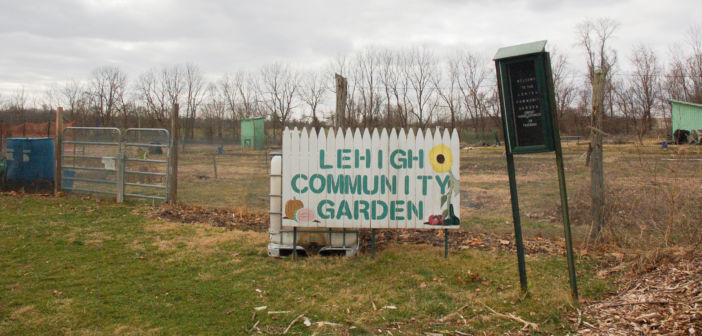The FEED group that hopes to bring a sustainable, cost-neutral farm to Lehigh presented in front of the Lehigh Environmental Advisory Group last month.
After beginning as a Mountaintop Initiative program in 2015, the FEED group plans to start a five-acre farm on Goodman Campus that could replace some of the vegetables used by Dining Services with sustainable, organic produce grown on Lehigh’s campus. The farm would also act as a tool for various academic classes and departments.
FEED project member Mike Miller, ’17, said attendees of the presentation included an engineering graduate student, undergraduate student representatives, Dining Services executive chef Joseph Kornafel, real estate services director Erin Kintzer and finance and administration vice president Pat Johnson.
“It seemed we hit all the major points that we wanted to, and we seemed pretty well prepared for the questions that they had,” Miller said. “In general, everyone seemed pretty impressed with the thoroughness in our presentation, and I think everyone in our group did a good job.”
Kornafel said he was impressed by the group’s proposal and presentation.
“I think they’re headed in the right direction,” Kornafel said. “We are more than happy to work with them, and I’m very excited for the opportunity.”
Kornafel said Dining Services and Sodexo worked with FEED to determine which crops would be beneficial for the farm to produce. He said they recommended FEED produce crops like onions, tomatoes, kale and other common foods used on a daily basis.
David Joseph, the executive director of student auxiliary services, said the farm was a “no-brainer” and that it was feasible since other colleges and universities have done it before.
“We just want to make sure they’re following all safety guidelines and food-handling guidelines properly, and I think they’ve come a long way with that,” Joseph said.
Kornafel said the biggest challenge is the farm’s maximum time for production will be in the summer, when Dining Services is the least busy. However, despite limited operations, they will still ensure produce won’t be wasted.
Lauren Sleeger, the director of Rathbone dining hall, said she was unable to attend the most recent presentation to the Lehigh Environmental Advisory Group, but she is excited the connections the farm creates between sustainability, Dining Services and academics have only become stronger.
“We would like that student interaction — actually helping to farm it and to determine it in different ways and then incorporating that into class structure in any way, shape or form — is really exciting and would enhance the university as well,” she said.
Sleeger said a lot of the produce Dining Services uses comes from a company called Common Market based in Philadelphia. Common Market brings in produce from farmers within a 250 mile-radius of Philadelphia and connects them to institutions such as universities, hospitals and public school systems.
She said this allows farmers to expand their operations beyond their local communities. Institutions benefit from the farmers’ produce and dining services at participating universities can serve the different food options that were grown locally.
Miller said there were only a few minor changes to their proposal that came out of the presentation.
FEED project member Casey Ching, ’17, said the biggest change was the addition of an academic coordinator position instead of a graduate assistant. She said this made it difficult for the farm to be cost-neutral, but it was a give-and-take with the university.
Ching said the presentation included more information about the business side of their farm and why it makes sense for Lehigh to provide support.
Isabel Buenaga, ’17, another student in the Global Citizenship group, said the next steps for FEED are contingent on the funding the group hopes to receive.
“From then on, it’s picking a farm manager and finding people who are interested who would want to be a part of the student team for the coming years,” Buenaga said.
Miller said he’s interviewed some people from his fraternity about the open positions but hasn’t made any decisions. There has been more interest than he expected, but Miller said he doesn’t want to bring more people onto the project until the group’s future funding is determined.
Buenaga said her advice to future FEED groups is to keep sight of the end goal.
“Don’t just get focused on the day-to-day aspects of the farming,” Buenaga said. “Think about the big picture of it and always take a step back and look at how you can affect more people.”






Comment policy
Comments posted to The Brown and White website are reviewed by a moderator before being approved. Incendiary speech or harassing language, including comments targeted at individuals, may be deemed unacceptable and not published. Spam and other soliciting will also be declined.
The Brown and White also reserves the right to not publish entirely anonymous comments.
1 Comment
Pingback: FEED group presents sustainable farm vision to Lehigh’s Environmental Advisory Group – Matthew Cossel